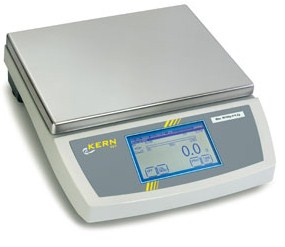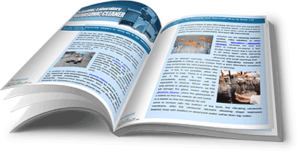How to Select a Digital Bench Scale
A bench scale is generally placed on – you guessed it – a bench or a countertop. A distinguishing characteristic of digital bench scales vs. platform scales is that the controls and display are part of the unit whereas a platform scale display is separate from the weighing platform.
Kern bench scales available from Tovatech have weighing ranges from 6 to 60 kg allowing them to support a broad range of applications. Most are available with standard disposable battery power or optional rechargeable battery power in addition to line power. This is a big plus if you need portability or perform weighing operations beyond the reach of an outlet.
Specifying Digital Bench Scales
This is a straightforward process until it comes to added bells and whistles you may require for your operations. First the basics:
At the top of your list is the maximum weight the scale can handle. If what you are weighing is placed in a container include the container weight in your specification. The tare function will discount that automatically but the scale must handle it.
Tip: Be realistic on specifying the maximum weight capacity you need. In general, scales with heavier weighing capacities have less precise values in terms of readout and linearity (see below).
The area or size of the weighing plate should be such that the load does not hang over the edge of the plate.
Readout is the weight you see on the display. An economically priced scale with a 30kg weighing capacity might have readout of 10 grams. A higher-end 30kg scale could have readout of 0.2 gram. Note that this feature is also termed resolution or readability by some manufacturers.
Tip: Some scales allow you to switch weighing units such as metric to English.
What accuracy do you require? The maximum difference between the actual load and the displayed weight throughout the scale’s weighing range is termed linearity, usually a ± number. The smaller the number such as ±0.15g the more accurate the scale.
Tip: Readout and linearity numbers relate directly to a scale’s maximum weighing range. Except for higher priced scales as the load capacity increases so do the linearity and readout numbers.
Calibration is an exercise that should be performed on a regular basis and any time the bench scale is moved. It is accomplished by placing the correct calibration weight on the weighing plate and activating the calibration function. For example a scale with a maximum weight of 30kg should be calibrated with 30kg weight. The scale will automatically adjust to the test weight, thereby correcting itself if needed.
Bench Scale Special Features
You can use your bench scale to perform a variety of functions by following directions in the owner’s manual. Not all functions are available on all models. Here is a short list of functions:
- Piece counting against a reference quantity.
- Percentage determination shows the deviation in % from a target value (100%).
- Recipe weighing documents the mixture of several components one by one. The weight of combined components can be called up for control purposes.
- Tolerance weighing or check weighing is a ± value of the target weight or number of pieces that is acceptable for cost control or regulatory guidelines.
- Dynamic weighing filters out vibrations (think of a cat on a scale) and displays an average weight.
- GLP protocol and ISO record keeping are accomplished by transferring data to a printer or computer. This is typically by an RS 232 interface.
- IP means ingress protection against dust and water. It consists of two numbers, the first against dust and the second against moisture. Higher numbers mean more protection. High end Kern bench scales have an IP of 65 or 67 indicating that they are dustproof (6) and can have temporary contact with liquids (5) or can be temporarily used in wet areas and washed with a water jet (7).
Legal for Trade Scales
A special category of scales – including bench type scales – are certified as legal for trade. Certification is a rigorous process managed by the National Conference on Weights and Measures and is mandatory for scales used commercially for products sold by weight. Check our post on legal for trade scales for a description of these devices and specification tips.
Contact the scientists at Tovatech for additional information on bench scales and other precision weighing instruments used in the research and educational institutions, production lines and for quality control purposes.

